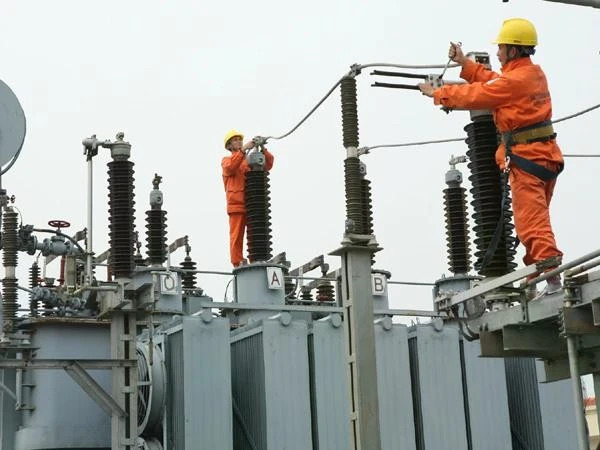
Vietnam Electricity (EVN) workers maintain electrical equipment. (Photo: VNA)
The Ministry of Industry and Trade (MoIT) will submit the revised National Power Development Plan VIII to the Prime Minister for approval by February 28, 2025, Deputy Minister Nguyen Hoang Long has said.
He made the statement while chairing a teleconference with 63 provinces and cities on December 31 to collect feedback to refine the revised plan.
During the event, Vu Van Dien, Vice Chairman of the Quang Ninh provincial People's Committee, proposed increasing the wind power capacity to 600 MW from 400 MW as specified in the existing plan, citing the province's significant potential for wind energy projects as shown by surveys. Additionally, he highlighted a 1,500 MW LNG power project initiated in 2021, which has been completed and is now ready for operation, pending the finalisation of project cost norms.
A representative from the Mekong Delta province of Kien Giang, known for its 200km coastline and large land area, also shared their recommendations. The province proposed adding 20 MW of waste-to-energy capacity, 1,600 MW of wind power, along with 1,000 MW of solar power from aquaculture zones. They noted that large areas currently used for shrimp farming could be optimised for solar energy projects, maximising both land use efficiency and economic returns.
Meanwhile, Pham S, Vice Chairman of the Lam Dong provincial People's Committee, suggested including pumped-storage hydropower projects on the Dong Nai River basin and exploring the potential for floating solar power projects on available water surfaces, including hydroelectric reservoirs. Similarly, Thai Nguyen province proposed an additional 10 MW of waste-to-energy capacity and 200 MW of solar power, highlighting vast unused rooftop space in its industrial zones.
Regarding concerns from Quang Ninh, Deputy Minister Long stated that the MoIT is finalising a draft decree guiding the development of LNG power projects, addressing key issues such as pricing mechanisms and guaranteed minimum electricity purchases. These measures aim to address obstacles currently hindering the progress of LNG power initiatives nationwide.
In terms of the development of rooftop and floating solar power projects, he noted that after the Government's issuance of Decree No. 135/2024/ND-CP, rooftop solar systems in industrial zones have seen substantial growth. The ministry is actively considering ways to expand the scope of these projects. Floating solar power projects, particularly those using existing hydroelectric reservoirs, will also be prioritised in the revised plan.
For waste-to-energy projects, Long emphasised that the ministry fully supports their expansion and will prioritise proposals from provinces that have detailed implementation plans.
The conference also reviewed the broader progress of renewable energy projects nationwide. As part of the adjustments, Vietnam has updated information about 123 wind power projects with a total capacity of 7,697.9 MW, 138 small hydropower projects with 1,484.58 MW, 21 biomass power projects with 414 MW, and 34 waste-to-energy projects with 621.1 MW.
On December 28, 2024, the Prime Minister issued Decision No. 1682/QD-TTg, approving updates to the implementation plan of Power Development Plan VIII for the 2021 - 2030 period, with a vision to 2050. This decision sets a clear framework for advancing renewable energy initiatives, improving infrastructure and fostering sustainable development.
To ensure the successful implementation of the revised power plan, the MoIT will collaborate closely with ministries, central agencies and localities to research and promulgate relevant policies to ensure consistency and feasibility in accordance with the country’s development situation and international practices, especially in the field of renewable energy. Focus will be placed on promoting renewable energy technologies, and training a high-quality workforce to meet the demands of the energy sector./.
VNA
Share